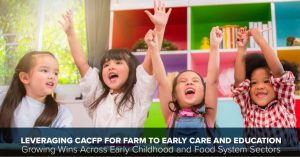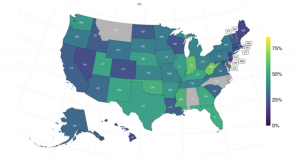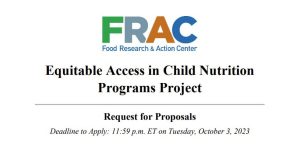Research
Leveraging CACFP for Farm to ECE
When combined, the CACFP and Farm to Early Care Education (Farm to ECE) activities can have an extraordinary impact on children, child care providers, and local communities. FRAC’s report aims to support child care providers to access CACFP and utilize it for eligible Farm to ECE activities by highlighting the mutually beneficial synergy between these initiatives.
Read MoreCACFP Indicator for State-Level Obesity Prevention
The CACFP is an indicator for state-level obesity prevention. The inclusion of the CACFP as an indicator for obesity-prevention shows that the CACFP is an important, recognized factor for proper development in the earliest stages of life.
Read MoreCACFP Important Factor for Obesity Prevention
The University of Colorado College of Nursing published their 2022 Annual Report on Achieving a State of Healthy Weight. The report determines how state regulations support obesity prevention in licensed ECE programs. It also highlights state successes and identifies opportunities for ECE regulations to improve support of obesity prevention in young children.
Read MoreState Agency Perspectives on Administering the CACFP
A study was published in October 2023 by the UConn Rudd Center for Food Policy and Health to explore federal and state policies and practices that support or discourage CACFP participation among child care centers. The report approaches: program outreach and administration, barriers that make CACFP participation challenging, and recommendations to expand access to CACFP for eligible providers.
Read MoreUntapped Potential: License-Exempt Home-Based Child care Providers
A study was published in October 2023 by the Urban Institute to identify major gaps in the CACFP’s coverage and ability to reach children. The study specifically focused on CACFP eligibility for small home-based child care providers who are legally exempt from their state’s child care licensing requirements.
Read MoreAfterschool Supper Participation Decreased from 2021 to 2022
A report by the Food Research and Action Center (FRAC) found that while participation in afterschool supper remained steady throughout the pandemic, there has been a 23% decrease in participation between October 2021 and October 2022.
Read MoreCACFP Underutilized and Unequally Accessed
A study was published in September of 2023 to assess the extent and reasons for the operation of the CACFP’s among licensed child care centers in order to identify opportunities for expanding CACFP nutrition support. The study found that the CACFP is underutilized and that there is unequal access in certain states and regions.
Read MoreCACFP Associated with Food Security for Young Children
A study was published in June of 2023 that found that children with child care-provided meals had lower odds of food insecurity, having poor health, or being admitted to the hospital compared to children with parent-provided meals.
Read MoreFRAC Research Funding Opportunity
FRAC has announced a Request for Proposal (RFP) for subgrants for its Equitable Access in Child Nutrition Programs project, supported by funding through a cooperative agreement with the U.S. Department of Agriculture Food and Nutrition Service (USDA FNS). Submit your CACFP proposal by October 3, 2023, at 11:59pm ET.
Read MoreChild Care Supports Academic Achievement and Physical Health
A study published in March of 2023, examines the impact of child care on the dietary quality of young children, as well as portrays the need for a more inclusive definition of ‘child care.’ Access to high-quality care supports the academic and social development of your children and is important for all families to reduce socioeconomic disparities.
Read More









